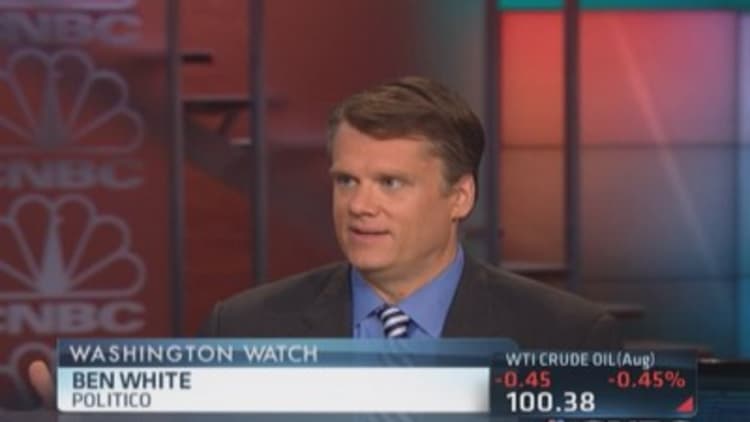
Congress this week begins a three-week sprint to summer recess that will feature a number of contentious issues, including replenishing the soon-to-be-depleted Highway Trust Fund and passing a terrorism reinsurance bill.
Both of those things are likely to get done, though the highway fund will likely get its money from ridiculous "pension smoothing," an accounting trick that allows corporations to underfund their retirement plans. That's the only way House Republicans will accept funding the bill because anything else, including hiking the gas tax, the traditional method, is now viewed as politically impossible.
Still, no member of Congress wants to go home saddled with responsibility for halting highway and bridge projects that help Americans get to their beloved summer destinations. A patch to keep road projects alive should make it through both chambers.
Much less certain is the fate of the Export-Import Bank, whose authorization expires on Sept. 30.
The Ex-Im bank, for decades a Roosevelt-era afterthought, has become the center of the deepening schism between the Republican Party's big business, center-right establishment core and the rising, populist, tea party faction that views the bank as corporate welfare for giants including Boeing and Caterpillar who don't need the help.
Read More Never heard of the Export-Import Bank? Here's why you will
House GOP conservatives have been going after Ex-Im, which turned a $1 billion profit for the Treasury on its guarantee and other fees last year, for several cycles now. But the campaign hit critical mass this year in large part because conservatives no longer fear losing financial support for their campaigns from groups like the Chamber of Commerce and Business Roundtable and the National Association of Manufacturers that strongly support Ex-Im re-authorization.
The Citizens United decision means that groups like Americans for Prosperity, the political arm of the billionaire industrialist Koch brothers, can spend unlimited sums defending Ex-Im critics and putting out reams of critical material on the bank.
The Kochs do not like the Ex-Im bank. So many conservatives no longer feel they have to roll over and vote to re-authorize the agency, which among other things provides loan guarantees to foreign buyers of U.S. manufactured products.
The dynamic is so different now that incoming House Majority Leader Kevin McCarthy, R-Calif., generally viewed as a business-friendly moderate, said in a recent interview that he no longer supports the bank. Outgoing majority leader Eric Cantor, R-Va., helped shepherd Ex-Im to re-authorization two years ago. Ex-Im is not the reason Cantor lost—far from it—but it certainly did not help his conservative credibility back home.
Read More Job growth good for Obama; stagnant wages not so much
The export bank is now a big issue in the 2014 campaign even though most average voters probably have no idea what it actually does.
The opposition from McCarthy and the consistent vocal criticism from conservative groups including Heritage Action and Americans for Tax Reform might make it seem like the bank is dead in the House of Representatives. Delta, which complains that sales of Boeing aircraft backed by Ex-Im benefit its international competitors, is also helping fund conservative public relations attacks on the bank.
But don't count it out just yet.
A person familiar with the matter said that McCarthy did not intend his remarks as an indication that he would actively try to block Ex-Im re-authorization. And Senate Democrats could pass a continuing resolution funding the government past the end of the fiscal year on Sept. 30 that includes Ex-Im re-authorization and dare the GOP House to vote it down and cause another government shutdown heading into the heart of the midterm elections in which Republicans, quite legitimately, believe they have a solid shot at taking back the Senate.
Republicans are not going to want to risk another hit to their image ahead of the November elections. So the more likely scenario would be a continuing resolution out of the Senate including Ex-Im re-authorization that passes the House with a majority of Democrats along with moderate Republicans.
Such an outcome would allow conservatives who ideologically oppose Ex-Im as a distortion of free market capitalism, as well as those who just don't want to be on the wrong side of the Koch brothers, to vote against the bank while not actually killing it or shutting down the government.
This is not the only possible scenario, of course. The House could also pass its own continuing resolution without Ex-Im re-authorization and try to force the Senate to take responsibility for a shutdown.
Read MoreHillary's money problem: How she made it
Still, it's easy to overestimate Ex-Im opposition. A total of 93 House Republicans opposed re-authorization in 2012. Even more could do so this time without killing the bank. And there is plenty of big money on the bank's side from Boeing, Caterpillar, G.E., the Chamber, NAM, Business Roundtable and other groups.
All of these organizations are helping to pay for research and PR flooding Congress and the public with data on the number of small and midsize businesses the bank supports (the bulk of its total number of loans, if not the total dollar amount) and what would happen if the U.S. unilaterally got out of the export support business while competitors including China and the European Union continued their mercantilist approaches.
In the end, the bet here is that Ex-Im will survive the latest round of conservative attacks but that it will be even closer than last time. And if you can't get enough of this topic, be sure to come to AEI in DC on July 24, where I'll moderate a debate on Ex-Im between Hamilton Place Strategies' Tony Fratto (pro) and AEI's Timothy P. Carney (con). It should be a lively chat.
—By Ben White. White is Politico's chief economic correspondent and a CNBC contributor. He also authors the daily tip sheet Politico Morning Money [politico.com/morningmoney]. Follow him on Twitter @morningmoneyben.


